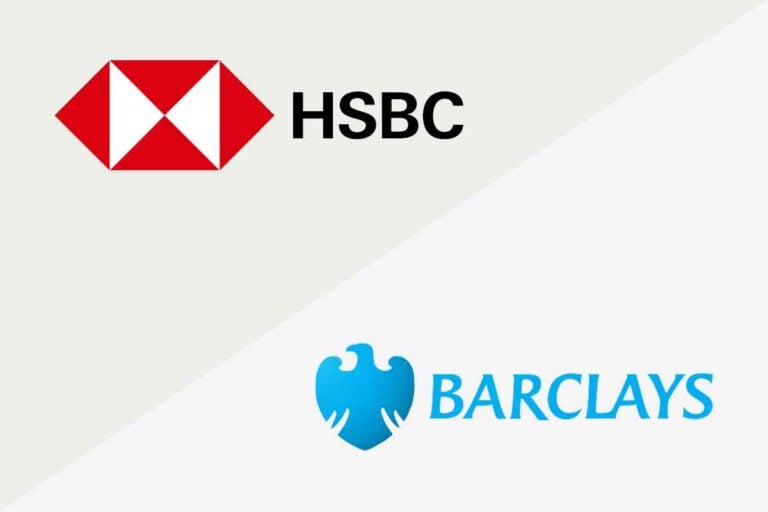When it comes to choosing a bank for your business, two prominent names that often come to mind in the UK are HSBC vs Barclays. Both banks have a long-standing reputation and offer a wide range of services for businesses of all sizes.
In this article, we will compare HSBC and Barclays in terms of their features, fees, unique offerings, and more to help you make an informed decision for your business banking needs.
HSBC vs Barclays
Before we dive into the details of each bank, let’s take a quick look at a features comparison table to give you an overview of what they offer:
| Features | HSBC | Barclays |
|---|---|---|
| Account Options | Various options available | Multiple account choices |
| Online Banking | Advanced digital solutions | Robust online platform |
| International Services | Extensive global network | Strong international focus |
| Customer Support | Dedicated business support | Tailored relationship model |
| Additional Services | Trade finance, insurance | Cash management solutions |
 | Tide Business Bank Accounts ✓ Free, Plus, or Pro Account ✓ iOS & Android Mobile App ✓ Upload & Auto-Match Receipts Pricing Trial period Contact | |
 | Card One Money ✓ No Credit Checks ✓ Simple Fees ✓ Up To 3.5% Cashback Pricing Trial period Contact | |
 | ANNA Money ✓ Apply In 10 Minutes ✓ Bookkeeping & Payroll Tools ✓ User-Friendly Mobile App Pricing Trial period Contact | |
 | HSBC Business Banking ✓ Business Current Account ✓ In-Branch, Online & App Banking ✓ FSCS Protected Pricing Trial period Contact | |
 | Metro Business Banking ✓ Business Current Account ✓ High Street Presence ✓ FSCS Protected Pricing Trial period Contact | |
 | Mettle Business Banking ✓ Business Bank Account ✓ Online & App ✓ Quick & Easy Application Process Pricing Trial period Contact | |
 | Monzo Business Banking ✓ Business Current Account ✓ Dedicated mobile app experience ✓ FSCS Protected Pricing Trial period Contact | |
 | Virgin Money ✓ Business M Account ✓ In-Store, Online & App Banking ✓ Insights & Forecasting Platform Pricing Trial period Contact |
HSBC
HSBC is one of the largest banks globally and has a significant presence in the UK. With a strong focus on international services, HSBC offers a wide range of banking solutions for businesses operating on a global scale.
Pros
- Extensive international network: HSBC provides access to a vast network of branches and ATMs worldwide, making it ideal for businesses with global operations.
- Trade finance expertise: HSBC offers trade finance solutions to facilitate international trade transactions, helping businesses manage their supply chain effectively.
- Advanced online banking: HSBC’s online banking platform provides robust features such as real-time transaction monitoring, international payments, and customizable reporting tools.
Cons
- Higher fees: HSBC’s fees and charges for certain services, such as international wire transfers, may be higher compared to other banks.
- Limited branch network in some regions: While HSBC has a global presence, the availability of physical branches may vary in certain regions, which could impact in-person banking requirements.
Table of fees and charges
Here’s a summary of some common fees and charges applicable to HSBC business accounts:
| Service | Fees |
|---|---|
| Monthly Account Fee | £12 – £32 |
| International Wire Transfer | £15 – £30 (varies by currency) |
| Cash Deposit Fee | 0.3% – 0.5% of the deposit |
| Foreign Exchange Fees | 2% – 4% (varies by currency) |
Unique and standout features
- HSBCnet: An advanced online banking platform that provides businesses with a comprehensive suite of digital tools and services for managing their accounts, payments, and more.
- HSBC Trade Transaction Tracker: A tool that enables businesses to track the status of their international trade transactions and gain real-time visibility into their supply chain.
Barclays
Barclays is a prominent UK-based bank known for its diverse range of business banking solutions. It caters to businesses of all sizes and offers various account options to suit different needs.
Pros
- Multiple account choices: Barclays offers a range of business accounts tailored to different types of businesses, from startups to established enterprises.
- Robust online platform: Barclays’ online banking platform provides a user-friendly interface with features such as mobile banking, real-time payments, and integration with accounting software.
- Tailored relationship model: Barclays assigns relationship managers to business customers, providing personalized support and advice based on their specific requirements.
Cons
- Limited international presence: While Barclays offers international services, its network may not be as extensive as HSBC’s, which could pose challenges for businesses with significant global operations.
- Limited trade finance solutions: Barclays’ trade finance offerings may not be as comprehensive as HSBC’s, which could be a drawback for businesses heavily involved in international trade.
Table of fees and charges
Here’s an overview of some common fees and charges associated with Barclays business accounts:
| Service | Fees |
|---|---|
| Monthly Account Fee | £6 – £40 |
| International Wire Transfer | £10 – £25 (varies by currency) |
| Cash Deposit Fee | 0.35% – 0.75% of the deposit |
| Foreign Exchange Fees | 1% – 3% (varies by currency) |
Unique and standout features
- SmartBusiness Dashboard: Barclays’ digital tool that provides businesses with real-time insights into their financial performance, cash flow forecasts, and integration with accounting software.
- Business Direct: A dedicated helpline and extended customer service hours exclusively for Barclays business customers, ensuring quick and efficient support.
Conclusion – HSBC vs Barclays
Choosing between HSBC and Barclays for your business banking needs ultimately depends on the specific requirements and priorities of your business.
If your company operates globally and requires extensive international services, HSBC’s vast network and trade finance expertise may be advantageous.
On the other hand, if you prefer a bank with multiple account options, a strong online platform, and personalized support, Barclays could be a suitable choice.
Consider factors such as fees, accessibility, customer support, and the unique features offered by each bank. It is also recommended to reach out to representatives from both banks to discuss your business needs in detail and explore any additional services or benefits they can provide.
Remember, this article provides a general overview, and it’s essential to conduct thorough research and seek professional advice before making a final decision.
FAQ
Yes, both HSBC and Barclays offer the option to open business accounts online. However, depending on the complexity of your business structure or additional requirements, you may need to visit a branch or provide additional documentation.
HSBC provides dedicated business support, while Barclays assigns relationship managers to business customers for personalized assistance. The level of customer support you prefer may influence your decision.
Yes, both banks offer business loan options. However, the specific terms, interest rates, and eligibility criteria may vary. It’s recommended to inquire with each bank to understand the loan options available to your business.
Yes, both HSBC and Barclays facilitate business account switching. They typically have dedicated switching services to make the process smoother, ensuring a seamless transition for your business.
Please note that the fees, features, and services mentioned in this article are subject to change. It is advisable to visit the official websites of HSBC and Barclays or contact their representatives for the most up-to-date and accurate information.

